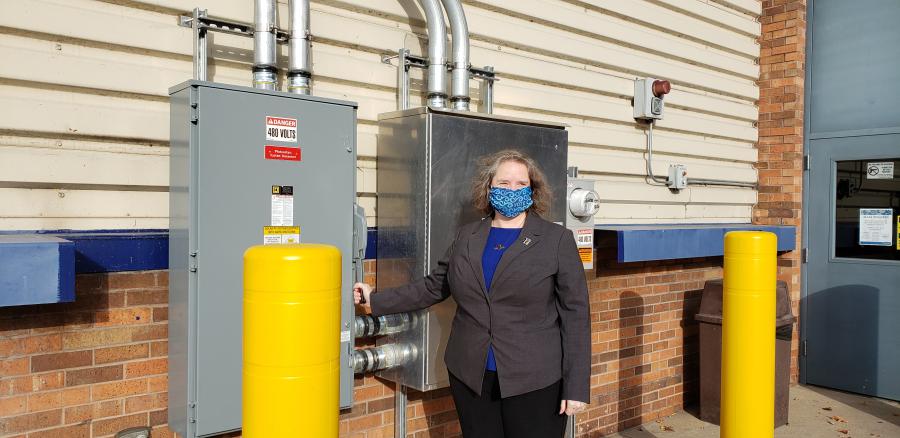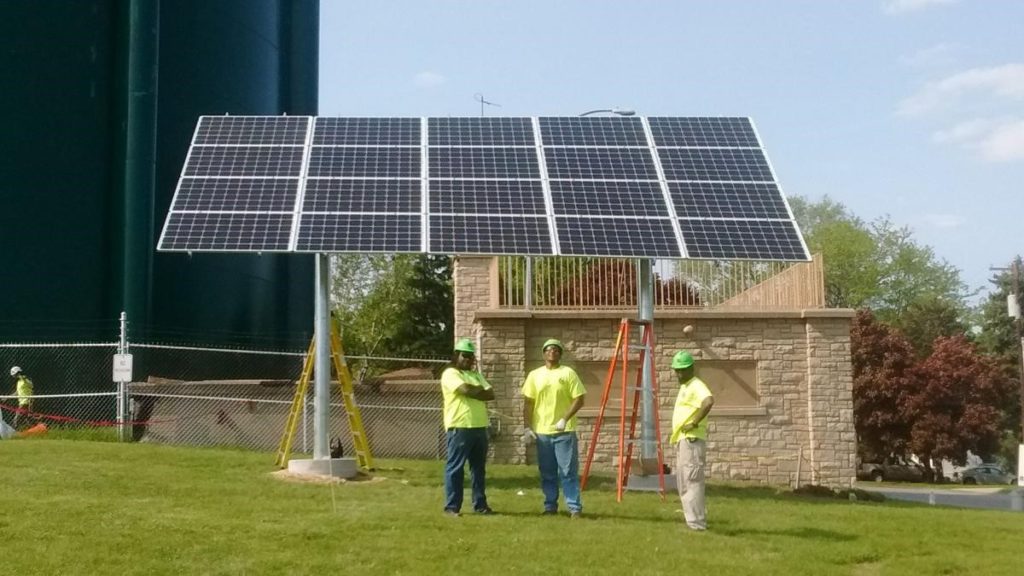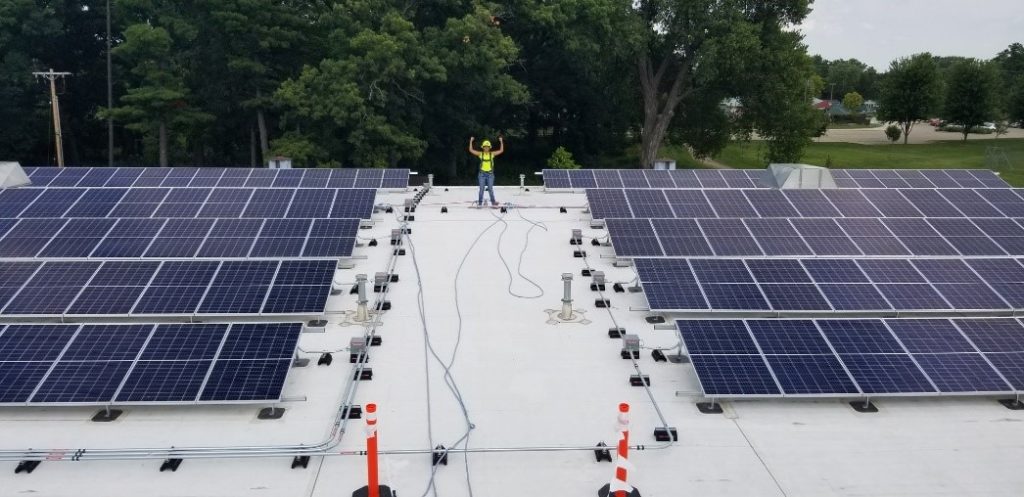Local Government:
City of Madison, WisconsinProject:
Madison MegawattCategory:
On-Site SolarProject Purpose
To install one megawatt of solar energy on City of Madison facilities by 2020 while launching and growing a City-led solar installation job training program.
Project Overview

In 2014, the City of Madison launched the Madison Megawatt initiative with a goal of installing one megawatt (MW) of on-site solar on its City facilities by 2020. The City steadily worked toward its target, and after two final installations in 2020 totaling 268 kilowatts (kWs)—a 28-kW project in July and a 240-kW project in October—Madison exceeded its 1 MW goal.
As the City kickstarted its Madison Megawatt initiative, it also recognized an opportunity to use its solar energy plans to create a co-benefit for its community members by combining the City’s solar installation efforts with a job training and employment program. In 2016, Madison launched its GreenPower Program as a pilot project. The program has grown every year since its inception—just last year, the City announced that it would double the size of the program.
Run by the City’s Engineering Division, GreenPower is a program where trainees with little to no prior electrical experience are paid to learn solar installation and electrical skills while installing solar systems on City facilities. After a year in the program, trainees have the background to launch a long-term career in solar energy, either as a permanent City employee or by going to work for a private company.
“Solar energy is a triple win for the community. It creates local jobs. It’s cost effective. It’s critical in achieving our climate goals and transitioning to clean energy sources. Installing solar panels on our own facilities will help us meet that goal while growing our local talent pool in the solar industry, which is necessary to help the rest of the City meet that goal.”
Madison Mayor Satya Rhodes-Conway

At of the end of 2020, GreenPower trainees were collectively responsible for installing 17 systems that helped Madison get 80 percent of the way toward its 1 MW achievement. Madison now has solar installations on 26 buildings, providing 2.5 percent of the City’s building electricity with on-site behind-the-meter solar energy. This on-site solar production adds to other renewable energy purchases the City makes through its utility, including energy from a 5 MW solar array and unbundled renewable energy certificates. Collectively, Madison now powers 74 percent of City operations from renewable sources.
For Madison, these efforts are only the beginning and more solar installations are already planned. With the GreenPower program expansion, the City aims to install another 1 MW of on-site solar by the end of 2022 and intends to install around 1 MW per year by 2023—all contributing toward its overall goal to achieve 100% renewable energy by 2030.
What were Madison’s biggest challenges in setting up this project?
Keeping costs down: Although the price of solar had dropped significantly over the past decade, the GreenPower installations required more time and labor than expected, due to the participant training involved, which increased project installation costs. For some incentive programs, this shifted the cost-effectiveness score of proposed projects, putting the City at a disadvantage in competition with private commercial installations. However, by finding other ways to save on costs, the City was able to qualify for previously unattainable grants.

Earning buy-in across City departments by focusing on project co-benefits: Buy-in for achieving 1 MW of renewables was not always widely shared across City departments and teams over the course of the project. Pressure on budgets and staff capacity made the goal seem unattainable at times, especially in the timeframe that was set. Staying focused on the dual outcomes of increasing the City’s renewable energy generation and creating job opportunities for historically marginalized groups helped maintain momentum for moving the project forward.
Responding to unexpected situations: Sometimes situations arose that were not anticipated during project planning. For example, the City’s engineering team created the GreenPower program in order to use the Madison Megawatt solar goal as an opportunity to provide solar job training for underrepresented members of the community. In one instance, though, some of the trainees did not have driver’s licenses at the start of the program—a requirement for most solar jobs. So, engineering staff went beyond the program’s scope and worked with these individuals to help them obtain driver’s licenses.
What advice would Madison give other local governments as they pursue climate action projects?
Partner with other stakeholders: Madison has had success in pursuing climate action projects through partnerships with renewable energy stakeholders, such as nonprofits, advocates, and training and education organizations. External partnerships can help a city alleviate capacity issues by providing access to knowledge, resources, and experience that the city may not have internally.
Plan and dedicate sufficient resources to your project: Having dedicated resources—both funding and staff—helps ensure climate action projects reach completion. If adequate resources, or a plan for obtaining and maintaining them, aren’t identified and committed from the start, changes in a city’s budgets or priorities could derail a project partway through its implementation.
How does this project fit into Madison’s broader climate and community goals?
In March 2017, Madison became the first Wisconsin city, and the largest city in the Midwest at that time, to formally commit to achieving community-wide goals of 100 percent renewable energy and net-zero carbon emissions. With this goal, the City developed a roadmap in 2019—the 100% Renewable Madison report—that lays out strategies to achieve these goals for municipal operations by 2030 and community-wide by 2050. Installing solar projects and growing programs like GreenPower will help Madison accelerate toward that goal over the next decade, all while creating local jobs. For example, the energy production from the on-site solar installations in Madison as of the end of 2020 collectively offset ~950 metric tons of carbon dioxide emissions per year.
Additional Information and Resources
- City Celebrates Major Solar Installation Milestone, Mayor Doubles GreenPower Program (City of Madison press release)
- Flip the Switch: Blending new and old, Solar installation on Historic Madison Municipal Building (City of Madison press release)
- GreenPower Program (City of Madison program website)
- 100% Renewable Madison report (City of Madison report)
- Madison ‘Flips the Switch’ on Largest Solar Project in City History (News story)
- 240-kW on Metro Transit Bus Garage (Solar array production monitoring)
- 28-kW on Madison Municipal Building (Solar array production monitoring)
This project was included on the Renewables Accelerator’s list: 10 of the Most Noteworthy Local Government Renewables Deals of 2020.
